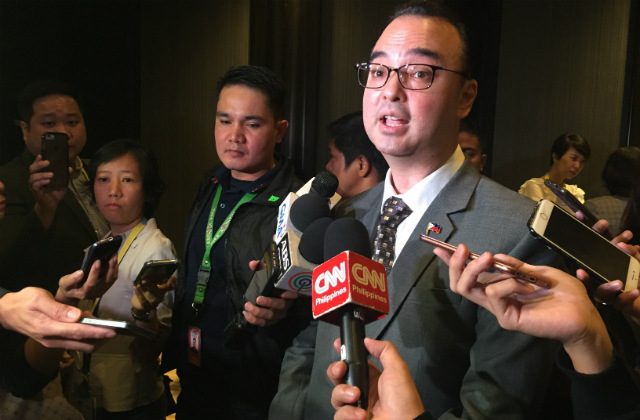SUMMARY
This is AI generated summarization, which may have errors. For context, always refer to the full article.

MANILA, Philippines – After months of talks with the European Union (EU), the Philippines announced it is rejecting all kinds of grants from the EU because of conditions that Europeans can supposedly use to criticize the Philippine government.
In an interview with reporters on Thursday, October 19, Cayetano said that this was based on a directive from President Rodrigo Duterte himself.
Days before this, Cayetano said he also “got the instructions” but “was not allowed to talk about it.”
He said Duterte, however, announced this decision “in front of the uniformed personnel and the Malacañang Press Corps.” He was apparently referring to Duterte’s speech on Wednesday, October 18, at Camp Bagong Diwa in Taguig City.
Cayetano said the Philippine government will soon relay this decision to EU Ambassador to the Philippines Franz Jessen.
“With the President’s directive now, then we’ll have to communicate formally to the EU ambassador, His Excellency Ambassador Jessen, that as of now, we will not accept aid,” Cayetano said.
“It should not affect our overall relationship. It should not affect our trade,” he added.
Asked if this involves all kinds of aid, Cayetano answered, “That’s my impression – so aid meaning grants.”
Cayetano explained in an interview on Wednesday evening that the EU might use “agreements” in line with donations “as an excuse to criticize us on certain aspects of our governance.”
‘Constructive dialogue’
Sought for comment, Jessen told Rappler, “I have seen some press reports, but have not talked directly with the foreign secretary these past few days.”
The Philippines’ decision comes after months of talks with the EU. The discussions began after the Philippine government confirmed on May 18 that it was no longer accepting new EU grants.
In an interview with reporters on May 25, visiting EU official Gunnar Wiegand pointed out that the Philippines’ reported rejection of EU assistance is not yet final.
Back then, he said the EU remained “in a constructive dialogue” with the Philippine government about what it meant when it said it is rejecting European aid.
Cayetano also said that he met with EU officials, and they “agreed on a couple of things.” He also said EU officials were surprised that he “offered a quarterly discussion on human rights.”
He said one of the EU’s conditions was that the EU can “unilaterally” cut aid to the Philippines in case of human rights violations, for example.
Cayetano said the Philippines didn’t want it to be unilateral. “Will there be no due process? Won’t we even talk?”
“But of course they were explaining to us, that’s standard and everything,” Cayetano said.
The EU’s Wiegand, however, earlier said that the EU will not “beg” the Philippines to accept European aid, as there “is no lack of other countries” to help if the Philippines rejects their offer. – Rappler.com
Add a comment
How does this make you feel?
There are no comments yet. Add your comment to start the conversation.